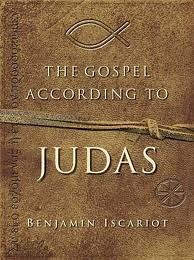Now here's an intriguing read! Novelist Jeffrey Archer, assisted by scholar Professor Francis J Maloney, has written a gospel for the 21st century that would also be believable by 1st century Jews and Christians. Judas Iscariot has been much maligned as the man who betrayed Jesus after accepting a bribe from the Jewish scribes of his day. After playing a central role in the death of Jesus he then hanged himself in shame. At least, that is how some of the New Testament gospels tell the story. But is that "history" correct?
In The Gospel According to Judas we hear from Judas's eldest son, Benjamin, about what really happened. Judas was deeply committed to following Jesus but misunderstood Jesus' mission. According to Benjamin he did not accept a bribe of 30 pieces of silver or suicide by hanging himself.
The Gospel According to Judas is a fictional gospel based on modern scholarship that questions some of the traditional gospels' events - or at least, the way we have traditionally interpreted them! For example, it is very unlikely that Judas would have hanged himself given that he was a pious Jew - something that would have been an unthinkable act for him. It is likely that his motivations were very good.
The Gospel According to Judas is a very clever piece of writing and illustrates how the gospels we have in the New Testament may have been written with particular emphases according to the authors' agenda. The Gospel According to Judas has material that clearly comes from the canonical gospels (in a similar way that Matthew and Luke drew from Mark and from another source) and is presented in red with references provided. At the back of the book is a glossary with scholarly notes and discussions about the basis of the claims made in the gospel itself. Variations from the traditional views regarding things like Judas's alleged accepting of a bribe are explained with evidence from historical and/or textual sources.
Reading this gospel raises some interesting reflections. For example, there are gospels that exist that have not been accepted as canonical by the Christian Church. But does that make them worthless? I don't think so. Whatever degree of authenticity they have, they provide a view of Jesus through the eyes of the author that is worth considering. They often raise legitimate questions worth exploring. In the case of The Gospel According to Judas we are led to question the assumptions we make about Judas. There seems to be good evidence that Judas has become a scapegoat when perhaps he might have been, at worst, misguided and, at best, a deeply committed follower of Jesus.
The Gospel According to Judas also illustrates the way in which "fiction" may convey truth. Some scholars have serious questions about the historicity of the gospels. Authorship of each of them is uncertain and they were written with variations that make it difficult to ascertain the chronology of events. But the truth about Jesus as understood by the early Christian Church is surely conveyed in these documents. In the same way, The Gospel According to Judas conveys it's own truth about Jesus. This "truth" may show us the way we might need to adjust some of our thinking about Jesus and those who associated with him. Most importantly, it provokes a revisioning of Jesus for our time and an opportunity for those who haven't thought about Jesus to read something contemporary but "authentic". Anything that gets people thinking about Jesus is worthwhile. The Gospel According to Judas is definitely worth a look.

Reviews have been mixed on this one, so good to hear from you. I think I'll put it on the reading list, but maybe not near the top.
ReplyDeleteTo refer to a book as "fiction" AND in the same breath as "authentic" is illogical, and contradictory. If the author wishes to take issue with the Biblical Gospel message, he is certainly free to do so; but a work that is admittedly "fiction" can no better establish accurate historicity than the [Gospel] "authors' agenda" he alleges.
ReplyDeleteTo refer to a book as "fiction" AND in the next breath as "authentic" is illogical, if not contradictory. If Mr.Archer and Prof.Maloney wish to question the historicity of the Biblical Gospels,they are certainly free to do so; but a work of fiction no more establishes historicity than does the purported "[Gospel]authors' agenda" they allege.
ReplyDeleteTo refer to a book as "fiction" (which it is), and in the same breath as "authentic" is illogical,if not contradictory. If the authors wish to question the historicity and message of the Biblical Gospels,they are certainly free to do so; but a work of fiction can no more stablish historicity than the "[Biblical] authors' agenda" they allege.
ReplyDelete